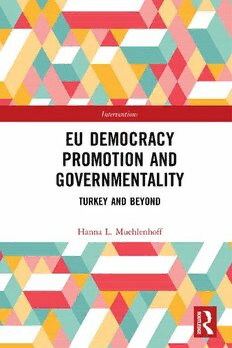
EU Democracy Promotion and Governmentality: Turkey and Beyond PDF
Preview EU Democracy Promotion and Governmentality: Turkey and Beyond
EU Democracy Promotion and Governmentality This book draws on a Foucauldian understanding of governmentality to explore how EU civil society funding policies depoliticise civil society orga- nisations. It questions whether international civil society funding always depoliticises civil society organisations, as the literature on governmentality and international civil society policies argues. The author examines how the liberal and neo-liberal rationalities of EU funding have both politicising and depoliticising effects on the human rights organisations funded, and demonstrates that whether the effects help or pre- vent the politicisation of human rights depends on how legitimate or con- tested the issue is domestically and how the civil society organisations act in this political context. These themes are explored through an in-depth analysis of the case of Turkey and EU funding of organisations working in the fields of women’s, LGBTand Kurdish rights. Unpacking liberal and neo-liberal governmentality in EU democracy pro- motion and civil society funding, this insightful contribution to the literature will be ofinterest to scholars of International Relations, Middle East Studies, European Studies and democracy promotion. Hanna L. Muehlenhoff is a lecturer at the Department of European Studies, University of Amsterdam (UvA). Her research is on the EU’s human rights promotion, gender and security policies, focusing on Turkey. She recently published in Politics and the International Feminist Journal of Politics. Interventions The series provides a forum for innovative and interdisciplinary work that engages with alternative critical, post-structural, feminist, postcolonial, psy- choanalytic and cultural approaches to international relations and global politics. In our first 5 yearswe have published 60 volumes. We aim to advance understanding of the key areas in which scholars working within broad critical post-structural traditions have chosen to make their interventions, and to present innovative analyses of important topics. Titles in the series engage with critical thinkers in philosophy, sociology, pol- itics and other disciplines and provide situated historical, empirical and tex- tual studies in international politics. We are very happy to discuss your ideas at any stage of the project: just contact us for advice or proposal guidelines. Proposals should be submitted directly to the Series Editors: (cid:1) Jenny Edkins ([email protected]) and (cid:1) Nick Vaughan-Williams ([email protected]). ‘As Michel Foucault has famously stated, “knowledge is not made for understanding; it is made for cutting” In this spirit The Edkins - Vaughan- Williams Interventions series solicits cutting edge, critical works that chal- lengemainstreamunderstandingsininternationalrelations.Itisthebestplace to contribute post disciplinary works that think rather than merely recognize and affirm the world recycled in IR’s traditional geopolitical imaginary.’ Michael J. Shapiro, University of Hawai'i at Manoa, USA Edited by Jenny Edkins, Aberystwyth University and Nick Vaughan-Wil- liams, University of Warwick Migrant Resistance in Contemporary Europe Maurice Stierl EU Democracy Promotion and Governmentality Turkey and Beyond Hanna L. Muehlenhoff Autonomy of Migration? Appropriating Mobility within Biometric Border Regimes Stephan Scheel The Anarchist Imagination Anarchism Encounters the Humanities and Social Sciences Carly Levy and Saul Newman EU Democracy Promotion and Governmentality Turkey and Beyond ff Hanna L. Muehlenho Firstpublished2019 byRoutledge 2ParkSquare,MiltonPark,Abingdon,OxonOX144RN andbyRoutledge 52VanderbiltAvenue,NewYork,NY10017 RoutledgeisanimprintoftheTaylor&FrancisGroup,aninformabusiness ©2019HannaL.Muehlenhoff TherightofHannaL.Muehlenhofftobeidentifiedasauthorofthiswork hasbeenassertedbyherinaccordancewithsections77and78ofthe Copyright,DesignsandPatentsAct1988. Allrightsreserved.Nopartofthisbookmaybereprintedorreproducedor utilisedinanyformorbyanyelectronic,mechanical,orothermeans,now knownorhereafterinvented,includingphotocopyingandrecording,orin anyinformationstorageorretrievalsystem,withoutpermissioninwriting fromthepublishers. Trademarknotice:Productorcorporatenamesmaybetrademarksor registeredtrademarks,andareusedonlyforidentificationandexplanation withoutintenttoinfringe. BritishLibraryCataloguinginPublicationData AcataloguerecordforthisbookisavailablefromtheBritishLibrary LibraryofCongressCataloging-in-PublicationData Acatalogrecordhasbeenrequestedforthisbook ISBN:9780815347729(hbk) ISBN:9781351168809(ebk) TypesetinTimesNewRoman byTaylor&FrancisBooks To my parents Elisabeth and Reimund, my godparents Heinrich Jürgenbehring and Barbara Lorenzkowski, and Carl J. Mauzy. This page intentionally left blank Contents List of tables viii Preface ix Acknowledgements xi List of abbreviations xii 1 Introduction: On EU democracy promotion, the question of depoliticisation, and the case of Turkey 1 2 (De)politicisation, (neo-)liberal governmentality, and hegemonic struggles 15 3 The (neo-)liberal governmentality of EU civil society programs 45 4 The (de)politicisation of women’s rights organisations in a complex context 70 5 (De)politicising LGBTrights organisations and the effects of visibility 91 6 The (de)politicisation of the securitised Kurdish rights issue 107 7 Conclusions 131 Bibliography 143 Index 168 Tables 2.1 Types of governmentality in the EU 31 2.2 Different representations of civil society in liberal and neo-liberal governmentality 32 2.3 Neo-liberal rationalities and depoliticising effects 36 Preface Ibeganthisprojectinahistoricalandpoliticalcontextthatwashopefulregarding Turkey’s future in the European Union as a result ofits democratisation process and the increasing pluralisation of Turkish society. Even so, ever since I started studying Turkey, classmates, colleagues, family and friends have asked me “Why Turkey”? They wonderedwhat this had to do with me and how I was going to studyTurkeywithoutspeakingTurkish.Unsurprisingly,learningTurkishhasbeen alongandchallengingpath,butIfounditobviouswhatTurkeyhadtodowithme. IwasveryidealisticabouttheEU’senlargementandIwantedtostudytheEU’s accessionpolicies.Inmyview,TurkeyhadtobecomeanEUmembersinceithad such a long historyof cooperation with the EU andwould contribute to aplur- alistic union. But in Germany, where I grew up and had studied, conservative politiciansandsectionsofthepublicopposedTurkey’smembershipcandidacyon thebaseofpopulistandxenophobicarguments.Thisapparentlyhadtodowiththe factthatmorethanonemillionpeoplewithaTurkishmigrationbackgroundand more than three million Muslims live in Germany. The German debate revealed how little Germans knew about Turkey and how little they knew their German‐ Turkish neighbours. As in other European countries, Turkey’s membership was also opposed on the grounds that Turkey supposedly did not belong to Europe, eithergeographicallyorreligiously.Iwantedtocounterthexenophobicandexclu- sionarysentimentsofthisdebateandgettoknowTurkeybettermyself.Iprobably wouldnothavepickedupthetopicifIhadnotmetpeoplesupportingmyinterest, suchasMechtildRothe,formermemberandvice‐presidentoftheEuropeanPar- liament,whowasengagedinthesolutionoftheCyprusconflict.Iwasaninternat . the Economic Development Foundation (IKV), which has strongly supported Turkey’s EU accession, during my first longer stay in Turkey in 2009. There, I started to wonder how the EU supported civil society in Turkey. This is why I decided to study what kind of effects the EU’s civil society funding has on civil societyorganisations(CSOs)inTurkey.Duringmyresearch,Ihavelearnedalot aboutTurkey’sdiversecivilsociety,andbeinginTurkeyrightaftertheGezipro- testswas inspiring and exciting. Although I take a critical look at what Turkey’s human rights organisations do, I have great respect for what they are trying to accomplish.Moreover,IamawarethatmyviewevenontheCSOsthatIstudied isstilllimitedandalwaysthatofanoutsider.IamstillinfavourofTurkey’sEU
